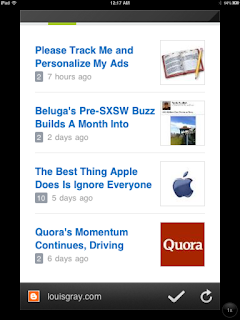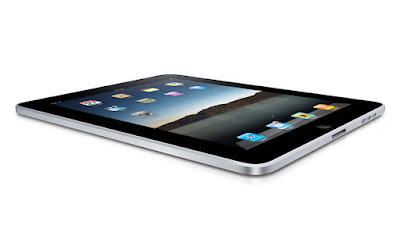
Despite my consistent begging for true wireless power (since 2007, at least), as ubiquitous as WiFi, only baby steps have been taken in the last few years to divorce us from our dependence on power cords to satiate our hungry electronic devices. As our devices become more capable, and we are seemingly constantly connected, incremental improvements in battery capabilities seem to be offset by parallel technology advancements, including faster, hotter, CPUs and features like multitasking, push notifications and real-time updates that drain the batteries of even my most advanced devices like a thousand pin-pricks to a taut water balloon.
There has become a dichotomy in my home between the power haves and the power have nots. Try as I may, my every trip requires careful planning of packing of power cords, overnight charging of some devices, and continuous charging of others, via adapters in my car's cigarette lighters or fruitful discovery of power outlets in restaurants, cafes, airport terminals and practically anywhere I can find them. To illustrate how obvious my issues are, one highlight of Christmas 2010 for me was my wife's purchase of a dual USB charger for the car, so I could charge both my phone and a tablet at the same time. Yes, it's that bad.
(Also on this topic: Charge Me Up: No Batteries Are Good Enough from June 2010 and line of site: Next Gen Batteries, where art thou?)
On the good side of power consumption, one finds obvious winners. The iPads go days without needing to be charged, assuming only infrequent use. The Barnes and Noble NOOKColor holds its charge for more than a week's time, if you are not reading every day. I've been absolutely comfortable taking Google's Chrome CR-48 notebook with me without packing my power cord, and can see eight hours of continual use before searching for a solution, and the Samsung Galaxy Tab, so long as its brightness is not at the highest position, simply needs to be charged each night, after a full day's work.
In contrast, I need only look up every few minutes at my MacBook Air's battery percentage to see the numbers slowly decrease. After a good two hours' effort, even without streaming music or Flash games, I'm well under fifty percent. And the pain in terms of battery life for my Android phone (the Epic 4G) is as bad, if not worse, than my experience with the HTC Evo, and before it, my iPhone 3G. Even with all sorts of work to turn off WiFi or GPS when unneeded, and using BlueTooth only in the car, the phone seems to live a mere four hours, whether I use it or not - and I'm not even getting close to mentioning talk time. At CES, I even bought an external battery extender, that supposedly gives a charge and a half, but it too seems to serve only to make my phone hot to the touch before both die.
The issues with keeping my phone up and running have become something of a laughingstock with friends who see the issues firsthand. Barak Hachamov, my partner at my6sense, sees my dance with electricity as we go meeting to meeting, and my wife knows I leave my phone plugged in at all times when I am not using it. There's no doubt I would probably make more phone calls on the device, if I wasn't constantly glaring at it sideways, or wondering why the battery seemed possessed. Trust me, I've been happy with Android from day one, and love it on my Galaxy Tab, but the Epic's great keyboard hasn't been enough to outweigh the battery problems and iffy GPS. It's enough to have me asking every Googler and non-Googler I know how well their own Nexus S devices are working, to see if I should stomach an early termination fee (ETF) and switch again.
(If you prefer iOS, note the same issues on iPhone from July 2009)
The gulf between what I see as fantastic power managers like the CR-48 and the tablets versus my other laptop and my mobile phone experience is mind-boggling. On one hand, you see things that seem to run forever, while on the other, things are feeling like they are going backward, teasing me into thinking I should just marry up a simple feature phone for calls with a plan-free Android device that lives on WiFi. But that's crazy talk.
At a panel in the first half of 2010, I was asked about what I thought would be hot markets to invest in, and I quickly mentioned two places - the first being teleportation, and the second being true wireless power. I stand by those demands. If Google can build self-driving robot cars, surely there's a department in the back finding a way to solve power consumption issues on Android phones, or finding unique ways to tap into static electricity, solar energy or something. Maybe I'd even accept a nuclear-powered laptop in exchange for going sterile. After all, with 3 kids under 3 already, I'm not exactly hurting for a full house.
Power cords are a menace to convenience. Crappy batteries are significant hindrances to us getting the full capabilities out of our laptops, tablets and mobile phones. From my experience, the tablet manufacturers are doing a great job, and the CR-48 is a fantastic first volley into the less-demanding laptop sector. But if there's any revolution I want to see in tech, it's this one. No more widgets and doodads until you solve this very basic thing for me - for all of us. Please.

















 The second-most popular activity on the Internet (ego stroking) just got yet another site. Silicon Valley's latest flame,
The second-most popular activity on the Internet (ego stroking) just got yet another site. Silicon Valley's latest flame, 




















 After years of living in the barren AT&T wilderness, iPhone fans and desperate would-be switchers are eagerly awaiting the widely
After years of living in the barren AT&T wilderness, iPhone fans and desperate would-be switchers are eagerly awaiting the widely